
Another “Hot Text” For the War on Women: Rosemary’s Baby
Roman Polanski’s 1968 horror flick—among others in the ’60s and ’70s—may provide some surprising insights into the GOP’s “War on Women.”
Read More
Roman Polanski’s 1968 horror flick—among others in the ’60s and ’70s—may provide some surprising insights into the GOP’s “War on Women.”
Read More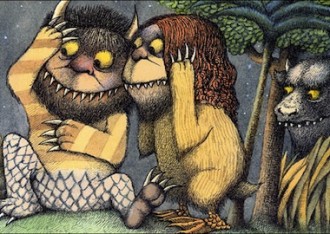
Maurice Sendak lived in the shadow of the Holocaust, yet he refused to claim that identity and chosenness solely for the Jewish people.
Read More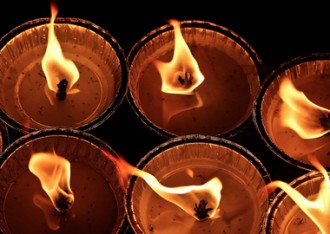
I have no desire to set off fireworks, jump into a car and yell out the window while waving fists and flags. If I were in New York City, I would light a candle at the memorial and keep vigil. In San Francisco, I pray in a room lit only by a streetlamp, filled with sadness for those who have died in America, Pakistan, Iraq, Afghanistan, and elsewhere, and apprehension at the terrorism-related deaths to come. Our work as Americans and Muslims is far from done.
Read More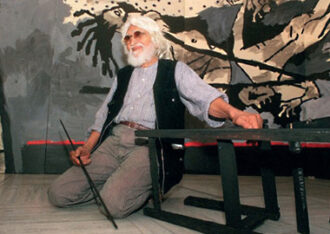
Maqbul Fida Husain, known as M.F. Husain, was India’s most famous, and its most infamous, contemporary painter. Often labeled the Picasso of India, his life and work spanned the 20th century and inched into the 21st century.
Read More
What might it mean for a synagogue, a church, a mosque, or a temple, to set up a video screen in its sanctuary and play these images of death from September 11—and then turn around and respond to them? What reinvented rituals might result from a ritualized, contextualized reception of these images? Such communal framing gets us beyond the questions of morbid voyeurism because it eliminates the one-way dimension and places images within a social setting. It further allows us to reflect and come to terms with dying, thereby stirring the potential for a good death.
Read More
Kinkade challenged the high-brow haughtiness of the art world, grew rich in the process, and seemed to fumble around, rock-star like, with drinking and bad behavior. Liberals scoffed at the hypocrisy of yet another social-religious conservative who can’t live up to a decent set of moral standards, while his mass-produced images were hugely loved, especially by evangelical Christians who felt that here, finally, was an artist for them. He called himself the “Painter of Light” and then trademarked the phrase. He includes a Christian fish (icthus) above his signature—but he’s also alleged to have urinated on a Winnie the Pooh figure at Disneyland, among other socially unacceptable activities.
Read More
We humans are, today, animals like any other. We always have been. Our culture, however, appears designed to culminate in a magnificently human apex. This has long been a problem when it comes to legal rights. I know I don’t have to explain that the fight for animal rights has fanned the flame of much heated political controversy. And I won’t take an ethical position on that now. Because I’m pointing to something else that, I think, is increasingly under fire: the powerful, dreamlike, quasi-trance state driven by that powerful myth of being human.
Read More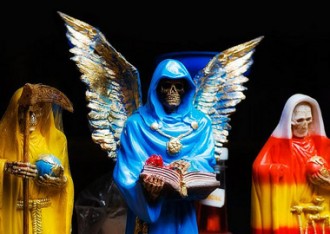
Mexico may have experienced its own “Manson moment” last month when eight devotees of “Santa Muerte” were arrested for the murder of three people, allegedly as human sacrifices. While the media has been fairly restrained in covering this event, these murders will likely have lasting consequences for alternative religion in North America. Like the Manson murders, the Santa Muerte murders present a concrete instance of violence that can be used to support much broader claims about the dangers of the religious and cultural Other.
Read More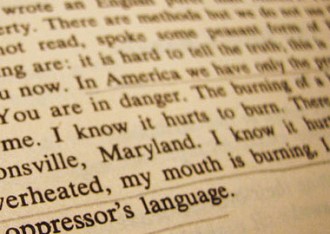
Rich’s approach to her religious identity was of a piece with her approach to every aspect of her identity. For Rich, any identity worth achieving involved struggle and resistance—be it national identity (“a patriot is one who wrestles for the / soul of her country / as she wrestles for her own being”), gender identity (“A thinking woman sleeps with monsters. / The beak that grips her, she becomes.”), or the committed poet’s identity (“She cannot teach the end of bonds; but she can refuse to justify, accord with, ignore their existence”).
Read More
Watching Higher Ground felt like catching a glimpse of a mythical creature I’d let myself imagine but never thought I’d see in real life. But suddenly there it was, projected on a big screen: sophisticated and complex theological thinking, a female protagonist interested in ideas and books and God, a friendship between two women that has very little to do with men and everything to do with trusting your body and your mind, and the insidious nature of religiously sanctioned sexism and its devastating effects.
Read More